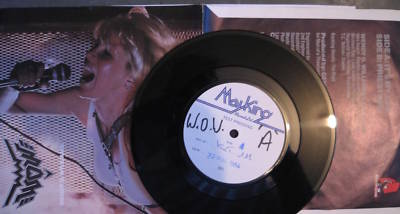WENDY O WILLIAMS IT'S MY LIFE TEST PRESS PLASMATICS 7"
£
23
$
28
Favourite Auctions
To save auctions to your favourites, please login
If you don't have an account, please register
Description
YOU ARE BIDDING ON AN EXCELLENT CONDITION
TEST PRESSING 7"
WENDY O WILLIAMS
IT'S MY LIFE
PRIESTESS
RELEASED ON MUSIC FOR NATIONS RECORDS KUT 111
THIS RECORD COMES IN A FOLD AROUND SLEEVE
WE DO COMBINE POSTAGE FOR ITEMS PURCHASED MEANING THAT WE DO PROVIDE POSTAGE DISCOUNTS ON MULTIPLE PURCHASES WHERE POSSIBLE, AS A RULE THE FIRST LP IS CHARGED AT STANDARD POSTAL RATE AND EACH ITEM THERE AFTER AT AROUND A 50% DISCOUNT, AND THE SAME GOES FOR 7" RECORDS, THERE MAY BE A FEW EXCEPTIONS TO THIS, SUCH AS BEING UNABLE TO COMBINE POSTAGE FOR A POSTER AND A RECORD, PLEASE FEEL FREE TO CONTACT US IF YOU ARE STILL UNSUREITEMS ARE PACKAGED IN STIFF CARD MAILERS WITH STIFFENERS, AND ARE REMOVED FROM SLEEVES PRIOR TO PACKING-UNLESS THE ITEM IS SOLD AS 'SEALED'
While she never earned the critical acclaim of artists like Patti Smith, Siouxsie Sioux, or Exene Cervenka, for many Wendy O. Williams was the first female face of punk rock. As the lead singer of the Plasmatics, Williams proved a woman could dish out on-stage mayhem as well as any man -- hoisting a chainsaw or a sledgehammer, Williams routinely destroyed guitars, smashed televisions, blew up automobiles, and generally left a trail of destruction in her wake. Williams also blended sex with anarchy, often appearing on stage stripped to the waist with shaving cream or electrical tape covering her nipples as a towering Mohawk bloomed from her scalp, creating a vision of a wildly empowered outlaw woman whose echoes would be felt in music and culture long after the Plasmatics called it quits.
Wendy Orlean Williams was born on May 28, 1949, in Rochester, NY. Williams's parents were strict and straight-laced, and her earliest exposure to performing came from taking tap-dancing lessons and appearing in the Peanut Gallery on The Howdy Doody Show at age seven. After completing ninth grade, Williams let her independent side take over; she quit school and traveled through Europe and the United States, taking odd jobs to support herself along the way. In 1976, Williams arrived in New York City and met Rod Swenson, a dada-influenced performance artist who was running an experimental erotic theater in Times Square as "Captain Kink." Williams became a performer in Swenson's shows and as he grew interested in the punk rock scene exploding in Manhattan and on the Bowery, they decided to form a rock band with Williams as lead singer. The band became the Plasmatics, who made their debut at CBGB in 1978; merging the simplicity of punk and the guitar attack of heavy metal, the Plasmatics were best known for the over-the-top destructive impact of their stage show as well as their forceful anti-authoritarian message. By 1980, the Plasmatics had become a major draw in New York and were developing an international reputation after they signed a deal with Stiff Records and released their first album, New Hope for the Wretched. In early 1981, Williams made headlines when she was arrested following a show in Milwaukee, WI, where police charged her with obscenity for miming masturbation on-stage using a sledgehammer. Following her arrest, Williams was beaten by the arresting officers (who claimed she attacked them), and her mug shot showed her bruised and battered. Several days later, Williams was arrested on similar charges in Cleveland, OH, though the police handled her more gently; she was cleared of all charges in both cities, though her lawsuit against the Milwaukee police for battery was unsuccessful. The publicity regarding Williams's legal problem had the unexpected consequence of raising her public profile considerably, and the Plasmatics found themselves making regular appearances on American television shows such as Fridays, SCTV, and Tomorrow, hardly common for an American punk band at the time. 1981 also saw the release of two Plasmatics records, the album Beyond the Valley of 1984 and the EP Metal Priestess, which put the group's metal influences into focus. Williams and the group continued to follow their new hard rock direction on their first major-label album, 1982's Coup d'Etat; that same year, Williams collaborated with Lemmy Kilmister of Motörhead on a duet single, covering the Tammy Wynette hit "Stand by Your Man." After the commercial disappointment of Coup d'Etat, Williams and Swenson opted to make a Wendy O. Williams solo album for an independent label, and 1984's WOW featured several members of the band along with producer Gene Simmons. While the album earned Williams a Grammy nomination for Best Female Rock Vocal Performance, it failed to break Williams into the mainstream as a solo act, and her 1986 follow-up, Kommander of Kaos, fared little better. That same year, Williams took a stab at acting, appearing in the tongue-in-cheek exploitation film Reform School Girls, though Williams previously made a memorable appearance in Candy Goes to Hollywood, an X-rated feature released in 1979. The Plasmatics returned in 1987 with a sci-fi concept album, Maggots: The Record, but it proved to be the group's last hurrah, and after recording a rap album, Deffest! and Baddest! under the name Ultrafly and the Hometown Girls, Williams opted to leave the music business. While she made a few acting appearances -- including a role in the independent film Pucker Up and Bark Like a Dog and a guest shot on an episode of McGyver -- for the most part Williams and Swenson lived quietly in Storrs, CT, and Williams devoted her energies to animal rehabilitation and promoting vegetarianism. On April 6, 1998, Williams, who according to Swenson had been suffering from a deep depression, committed suicide, shooting herself in the head in a wooded area not far from her home.
price rating
